Muscle
What is a muscle?
A muscle is a soft tissue in the body of humans and animals. It has the ability to contract, producing movement or maintaining the position of parts of the body.
Types of Muscles
There are three main types of muscles in the body:
- Skeletal Muscles: These are attached to the bones and are responsible for voluntary movements such as walking and lifting.
- Smooth Muscles: These are found in the walls of internal organs and blood vessels, and control involuntary movements.
- Cardiac Muscles: These are found in the heart and are responsible for pumping blood throughout the body.
Structure of a Muscle
A muscle is made up of muscle fibers, blood vessels, nerves, and connective tissue. The muscle fibers are the cells that make up the muscle and are capable of contracting.
Function of Muscles
Muscles have several important functions in the body, including:
- Producing movement
- Maintaining posture and body position
- Supporting soft tissues
- Guarding entrances and exits of the digestive and urinary tracts
- Generating heat to maintain body temperature
How Muscles Work
When a muscle contracts, it becomes shorter and thicker, pulling on the bones to which it is attached and causing movement.
Study Tips
To study muscles effectively, consider the following tips:
- Learn the names and locations of major skeletal muscles in the body.
- Understand the different types of muscle contractions, such as isotonic and isometric contractions.
- Explore the role of muscles in specific movements and exercises, such as running, jumping, and weightlifting.
- Consider the effects of exercise and physical activity on muscle strength and endurance.
[Muscle] Related Worksheets and Study Guides:
.◂Science Worksheets and Study Guides Eighth Grade. Organic compounds
Study Guide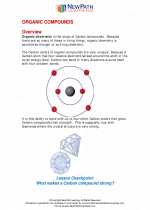 Organic compounds
Organic compounds  Worksheet/Answer key
Worksheet/Answer key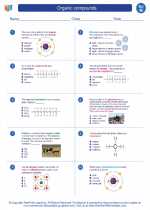 Organic compounds
Organic compounds  Worksheet/Answer key
Worksheet/Answer key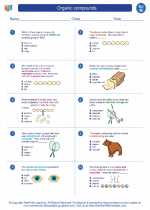 Organic compounds
Organic compounds  Worksheet/Answer key
Worksheet/Answer key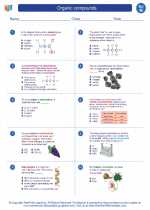 Organic compounds
Organic compounds  Vocabulary/Answer key
Vocabulary/Answer key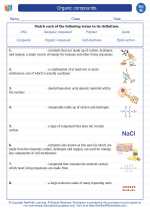 Organic compounds
Organic compounds  Vocabulary/Answer key
Vocabulary/Answer key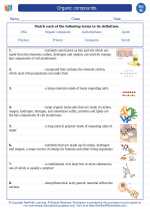 Organic compounds
Organic compounds 

 Worksheet/Answer key
Worksheet/Answer key
 Worksheet/Answer key
Worksheet/Answer key
 Worksheet/Answer key
Worksheet/Answer key
 Vocabulary/Answer key
Vocabulary/Answer key
 Vocabulary/Answer key
Vocabulary/Answer key

The resources above cover the following skills:
Physics: Students will use scientific skills and processes to explain the interactions of matter and energy and the energy transformations that occur.
Thermodynamics: Identify and explain that heat energy is a product of the conversion of one form of energy to another.
Identify and describe the various forms of energy that are transformed in order for systems (living and non-living) to operate: Chemical - Flashlight-Light; Mechanical - Pulleys-Motion; Solar/Radiant - Solar calculator; Chemical - Plant cells.